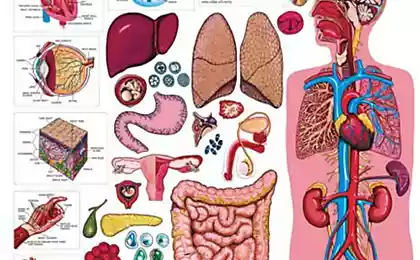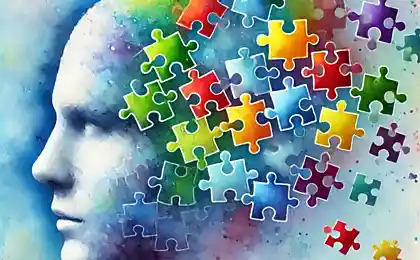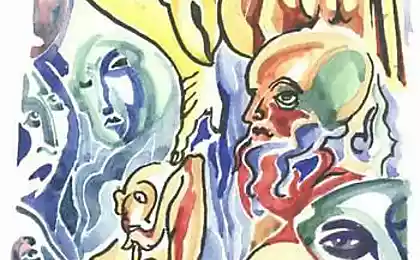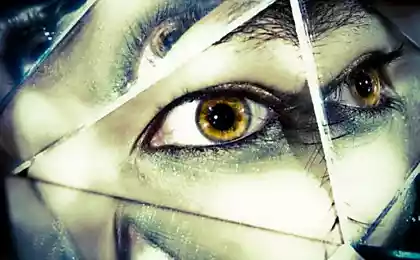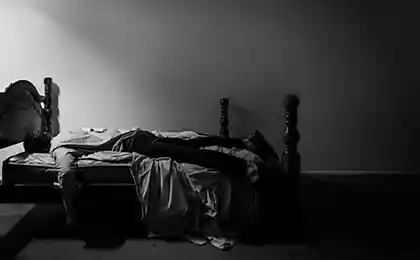555
Schizophrenia: when to start worrying?
This disease suffer 1.5 million Russians. It often appears between the ages of 15 to 25 years old, her first symptoms resemble the signs of teenage crisis... Experts answer questions that concern parents.
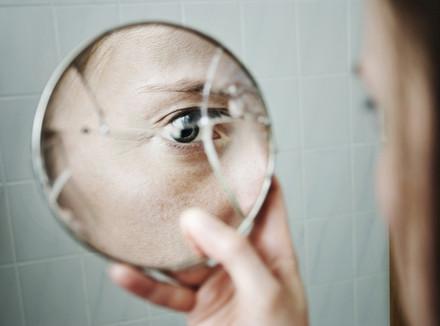
Six months after his 17th birthday, Julia refused to come out of her room: she began to feel that others are reading her mind and plotting against her. All inquiries through clenched teeth she replied that everything is in order. Her parents thought that her daughter suffers from a gap with a young man, and was hoping that this explains the strangeness in her behavior. Only when Julia began to hear voices in an empty room (she suspected that somewhere in the set of the mysterious transmitter that sends them), in a moment of lucidity she said to herself that this is not normal...
"When we think about madness, most often we think of a man with schizophrenic disorder, says psychologist Philip Zimbardo. – Schizophrenia is a mental disorder, in which consciousness breaks up into fragments, thought and perception are distorted and emotions are blunted".
Triggers the disease usually, a lot of stress, more serious illness, or the atmosphere in the family
The disease may begin gradually, and its first symptoms are easily confused with the crisis of adolescence. The more that medical tests (MRI, blood tests) schizophrenia not detected. It may take more or less serious forms. Someone will dive deeper into the illness and will spend most of his life in the hospital. Other symptoms will subside so that they will be able to lead an independent life and work. In order to successfully withstand the disease, it is crucial to understand it better. We asked experts to answer the questions that worry parents most.
What are the symptoms?
Schizophrenia often first appears between 15 and 25 years. Isolation, failure to act, difficulties in communication, mood swings – some symptoms of schizophrenia really resemble manifestations of teenage crisis. But there is no reason to seriously worry, there is yet no hallucinations, delusions and speech disorders.
To hallucinate means to perceive (see, hear, or feel) something that does not exist, but it seems real. "Delusion arises from the fact that some of their unpleasant thoughts or feelings the person perceives as something not belonging to him, separate from him, and they take the form of disturbing visions or voices," explains clinical psychologist Tatyana Voskresenskaya. For example, a person with a heavy sense of guilt may be hallucinating to see a gang of torturers (representing punishment) who want to kidnap him.
Normal weird teenager? But if they continue many months in a row, it can be assumed the disease
Delusions – false ideas that persist despite the evidence to the contrary (for example, Julia explained their "voices" existence "transmitter"). And, paradoxically, it is also an attempt of self-healing.
"Force of imagination, the adolescent creates a picture of the world more understandable and less painful than real, says psychiatrist and psychotherapist Sergei Medvedev. Is a way to cope with the situation, which for him is unbearable. Although this method is not too good and renders it unable to adapt to the environment, other had at this point, just no."
Psychiatrist Igor Makarov in "Lectures on child psychiatry" talks about a teenager, which at night came "dinosaurs and hippos, with red horns, red teeth. "They have a brutal voice... wild... And they say I with someone had a fight with my mother fought..." Nonsense is helping the patient "to associate her anxiety with some object, explain the fact it at least a little better", said Tatyana Voskresenskaya.
Finally, during acute conditions observed speech disorders. The connectivity of the statements is lost. "The schizophrenic deals with imaginary characters about imaginary situations and are not able to clearly tell what was happening to him," – says Tatyana Voskresenskaya. Patients also invent new words, giving them a sense that they understand one. However, in patients there are moments of relative calm, when they are easier to engage in dialogue.
Schizophrenia: when to start worrying?
Where does schizophrenia?
We are forced to admit the exact causes of the disease, no one knows. Put forward three hypotheses.
The first is genetic. "The risk of becoming schizophrenic is increased if this disorder is one of the relatives", – says the researcher of schizophrenia Irving Gottesman. But it's not just heredity. Triggers the disease usually, a lot of stress, more serious illness, or the atmosphere in the family – a sick relative, dealing with a child, may convey to him your fears, and behaviors.
The second biological. From the point of view of biology adolescence is a period when the reconstructed brain structures. Some neural connections arise, others disappear. "Maybe some teenagers happen "accidents" that disrupt the ability to cope with stressful situations and strong feelings – explain psychiatrists Raquel Gur and Godfrey Pearlson. But they can simply accompany the disease, but its cause is something else".
The third hypothesis is the psychoanalytic. According to her, "are inclined to disease, those who unconsciously sees itself as part of mother's body, says psychoanalyst Virginie MEGGLE. – A man unable to cope with situations symbolically represents separation from parents: a test in school, divorce, sexual fantasies, loss of a loved one. They hurt him and can trigger the onset of the disease".
Personal experience
Schizophrenia: when to start worrying?
"I must remember that my son and his illness is not the same"
Alexander, the father of 23-year-old Nicholas: "but I don't get along with my son's illness. What he has endured is unbearable, and what he puts his family, too unbearable. Schizophrenia distorts relationships: I need to somehow separate your child from his illness. But it-that this distinction does not: "It is normal that I don't clean his apartment: I'm sick. It's okay that I call you eight times a day or that I never answer the message you left: I'm sick." To face this, we must remember that we wanted this child, he is not only their disease, which is the son, brother, grandson...
To stay, I collected information about the disease, treatment. But in the end I do not know. This is a situation that I will never get used and you cannot change it. I have a child. He lives. He's drawn to us. It knows no rest and gives us a break. I tried to put between them, the disease and a barrier, which once safeguarded the family, and himself: for example, before sending the response to the message, I have long considering, trying to gauge what he says to me, depending on the state in which it is, in my view, is.
We never can get into the head of another, especially someone who suffers from mental illness. I'm not in his place and gave up trying to stand in his place. Sometimes I think he understands me better than I him. It's awful. I have nothing, no confidence... the Only thing I know is that love is the best medicine. I try to keep her and to love your son."
Blame do drugs?
Almost one in five of 18-24 year olds reported that his friends use drugs. But the number of patients with schizophrenia, according to the world health organization remains stable and the same in all countries (approximately 1% of the population, which corresponds to almost half a million people in Russia). Many of them never used drugs. However, drugs, including marijuana Smoking, can accelerate disease progression and to influence the frequency and severity of relapses recognized by most psychiatrists.
"Even soft drugs lower the barrier between the conscious and the unconscious, and there breaking the frightening impulses. In some cases, that provokes the disease," emphasizes Tatiana Voskresenskaya.
Does a human disease threat?
"The risk of patients with schizophrenia are greatly exaggerated, – said Sergey Medvedev. If they find themselves in a criminal situation, it is often as victims". The schizophrenic is much more dangerous for himself than for others. The propensity for violence may appear mainly under the influence of morbid hallucinations – for example, when he begins to think that it wasn't his father, but a demon. In moments of acute crisis, the schizophrenic does not realize the severity of his condition. Sometimes required hospitalization to protect the person from himself, to avoid suicide attempts.
Whom to contact?
"It makes sense to choose an experienced specialist, whom you trust, recommends Sergey Medvedev. Is not necessarily a psychiatrist, you can go to a psychologist, social pedagogue or a General practitioner. And a specialist will help you decide where to send a patient for consultation and treatment."
According to the Law on psychiatric care parents have the right to cause psychiatrist child up to 15 years. "They can come for starters even without him, – continues Sergey Medvedev – their presence is more significant than the presence of a child. Because they have to make a decision and to influence the situation". After that for treatment to a psychiatrist, you need the consent of the patient. "But it always is not about to change man, and that to help him," – emphasizes Sergei Medvedev.
Approximately 25% of those who have been diagnosed with schizophrenia, eventually stabiliziruemost
The treatment is helping?
Methods of treatment of schizophrenia is constantly improving. They combine medication and psychotherapy, which allows the teenager to understand why it failed to build for themselves an internal space. It also helps him to find support – it can be literature, drawing, photography, caring for animals, music... "it is Very important to see a special gift to each patient, emphasizes Virginie MEGGLE. – Yes, indeed, nobody knows how to cure schizophrenia, but it can be managed. Try to understand your child."
Schizophrenics can learn to understand their disease, even if can't completely control it. And approximately 25% of those who have been diagnosed with schizophrenia, eventually stabiliziruemost. Sergey Medvedev added that "modern means of rehabilitation and psychotherapy achieve a remission (symptoms subside), which saw schizophrenic during this period, aware of its history, the psychiatrist would not put him this diagnosis."

Six months after his 17th birthday, Julia refused to come out of her room: she began to feel that others are reading her mind and plotting against her. All inquiries through clenched teeth she replied that everything is in order. Her parents thought that her daughter suffers from a gap with a young man, and was hoping that this explains the strangeness in her behavior. Only when Julia began to hear voices in an empty room (she suspected that somewhere in the set of the mysterious transmitter that sends them), in a moment of lucidity she said to herself that this is not normal...
"When we think about madness, most often we think of a man with schizophrenic disorder, says psychologist Philip Zimbardo. – Schizophrenia is a mental disorder, in which consciousness breaks up into fragments, thought and perception are distorted and emotions are blunted".
Triggers the disease usually, a lot of stress, more serious illness, or the atmosphere in the family
The disease may begin gradually, and its first symptoms are easily confused with the crisis of adolescence. The more that medical tests (MRI, blood tests) schizophrenia not detected. It may take more or less serious forms. Someone will dive deeper into the illness and will spend most of his life in the hospital. Other symptoms will subside so that they will be able to lead an independent life and work. In order to successfully withstand the disease, it is crucial to understand it better. We asked experts to answer the questions that worry parents most.
What are the symptoms?
Schizophrenia often first appears between 15 and 25 years. Isolation, failure to act, difficulties in communication, mood swings – some symptoms of schizophrenia really resemble manifestations of teenage crisis. But there is no reason to seriously worry, there is yet no hallucinations, delusions and speech disorders.
To hallucinate means to perceive (see, hear, or feel) something that does not exist, but it seems real. "Delusion arises from the fact that some of their unpleasant thoughts or feelings the person perceives as something not belonging to him, separate from him, and they take the form of disturbing visions or voices," explains clinical psychologist Tatyana Voskresenskaya. For example, a person with a heavy sense of guilt may be hallucinating to see a gang of torturers (representing punishment) who want to kidnap him.
Normal weird teenager? But if they continue many months in a row, it can be assumed the disease
Delusions – false ideas that persist despite the evidence to the contrary (for example, Julia explained their "voices" existence "transmitter"). And, paradoxically, it is also an attempt of self-healing.
"Force of imagination, the adolescent creates a picture of the world more understandable and less painful than real, says psychiatrist and psychotherapist Sergei Medvedev. Is a way to cope with the situation, which for him is unbearable. Although this method is not too good and renders it unable to adapt to the environment, other had at this point, just no."
Psychiatrist Igor Makarov in "Lectures on child psychiatry" talks about a teenager, which at night came "dinosaurs and hippos, with red horns, red teeth. "They have a brutal voice... wild... And they say I with someone had a fight with my mother fought..." Nonsense is helping the patient "to associate her anxiety with some object, explain the fact it at least a little better", said Tatyana Voskresenskaya.
Finally, during acute conditions observed speech disorders. The connectivity of the statements is lost. "The schizophrenic deals with imaginary characters about imaginary situations and are not able to clearly tell what was happening to him," – says Tatyana Voskresenskaya. Patients also invent new words, giving them a sense that they understand one. However, in patients there are moments of relative calm, when they are easier to engage in dialogue.
Schizophrenia: when to start worrying?
Where does schizophrenia?
We are forced to admit the exact causes of the disease, no one knows. Put forward three hypotheses.
The first is genetic. "The risk of becoming schizophrenic is increased if this disorder is one of the relatives", – says the researcher of schizophrenia Irving Gottesman. But it's not just heredity. Triggers the disease usually, a lot of stress, more serious illness, or the atmosphere in the family – a sick relative, dealing with a child, may convey to him your fears, and behaviors.
The second biological. From the point of view of biology adolescence is a period when the reconstructed brain structures. Some neural connections arise, others disappear. "Maybe some teenagers happen "accidents" that disrupt the ability to cope with stressful situations and strong feelings – explain psychiatrists Raquel Gur and Godfrey Pearlson. But they can simply accompany the disease, but its cause is something else".
The third hypothesis is the psychoanalytic. According to her, "are inclined to disease, those who unconsciously sees itself as part of mother's body, says psychoanalyst Virginie MEGGLE. – A man unable to cope with situations symbolically represents separation from parents: a test in school, divorce, sexual fantasies, loss of a loved one. They hurt him and can trigger the onset of the disease".
Personal experience
Schizophrenia: when to start worrying?
"I must remember that my son and his illness is not the same"
Alexander, the father of 23-year-old Nicholas: "but I don't get along with my son's illness. What he has endured is unbearable, and what he puts his family, too unbearable. Schizophrenia distorts relationships: I need to somehow separate your child from his illness. But it-that this distinction does not: "It is normal that I don't clean his apartment: I'm sick. It's okay that I call you eight times a day or that I never answer the message you left: I'm sick." To face this, we must remember that we wanted this child, he is not only their disease, which is the son, brother, grandson...
To stay, I collected information about the disease, treatment. But in the end I do not know. This is a situation that I will never get used and you cannot change it. I have a child. He lives. He's drawn to us. It knows no rest and gives us a break. I tried to put between them, the disease and a barrier, which once safeguarded the family, and himself: for example, before sending the response to the message, I have long considering, trying to gauge what he says to me, depending on the state in which it is, in my view, is.
We never can get into the head of another, especially someone who suffers from mental illness. I'm not in his place and gave up trying to stand in his place. Sometimes I think he understands me better than I him. It's awful. I have nothing, no confidence... the Only thing I know is that love is the best medicine. I try to keep her and to love your son."
Blame do drugs?
Almost one in five of 18-24 year olds reported that his friends use drugs. But the number of patients with schizophrenia, according to the world health organization remains stable and the same in all countries (approximately 1% of the population, which corresponds to almost half a million people in Russia). Many of them never used drugs. However, drugs, including marijuana Smoking, can accelerate disease progression and to influence the frequency and severity of relapses recognized by most psychiatrists.
"Even soft drugs lower the barrier between the conscious and the unconscious, and there breaking the frightening impulses. In some cases, that provokes the disease," emphasizes Tatiana Voskresenskaya.
Does a human disease threat?
"The risk of patients with schizophrenia are greatly exaggerated, – said Sergey Medvedev. If they find themselves in a criminal situation, it is often as victims". The schizophrenic is much more dangerous for himself than for others. The propensity for violence may appear mainly under the influence of morbid hallucinations – for example, when he begins to think that it wasn't his father, but a demon. In moments of acute crisis, the schizophrenic does not realize the severity of his condition. Sometimes required hospitalization to protect the person from himself, to avoid suicide attempts.
Whom to contact?
"It makes sense to choose an experienced specialist, whom you trust, recommends Sergey Medvedev. Is not necessarily a psychiatrist, you can go to a psychologist, social pedagogue or a General practitioner. And a specialist will help you decide where to send a patient for consultation and treatment."
According to the Law on psychiatric care parents have the right to cause psychiatrist child up to 15 years. "They can come for starters even without him, – continues Sergey Medvedev – their presence is more significant than the presence of a child. Because they have to make a decision and to influence the situation". After that for treatment to a psychiatrist, you need the consent of the patient. "But it always is not about to change man, and that to help him," – emphasizes Sergei Medvedev.
Approximately 25% of those who have been diagnosed with schizophrenia, eventually stabiliziruemost
The treatment is helping?
Methods of treatment of schizophrenia is constantly improving. They combine medication and psychotherapy, which allows the teenager to understand why it failed to build for themselves an internal space. It also helps him to find support – it can be literature, drawing, photography, caring for animals, music... "it is Very important to see a special gift to each patient, emphasizes Virginie MEGGLE. – Yes, indeed, nobody knows how to cure schizophrenia, but it can be managed. Try to understand your child."
Schizophrenics can learn to understand their disease, even if can't completely control it. And approximately 25% of those who have been diagnosed with schizophrenia, eventually stabiliziruemost. Sergey Medvedev added that "modern means of rehabilitation and psychotherapy achieve a remission (symptoms subside), which saw schizophrenic during this period, aware of its history, the psychiatrist would not put him this diagnosis."
Tile Italon - Russian production with Italian design
HOW TO RECOGNIZE THE FIRST SIGNS OF SCHIZOPHRENIA?









